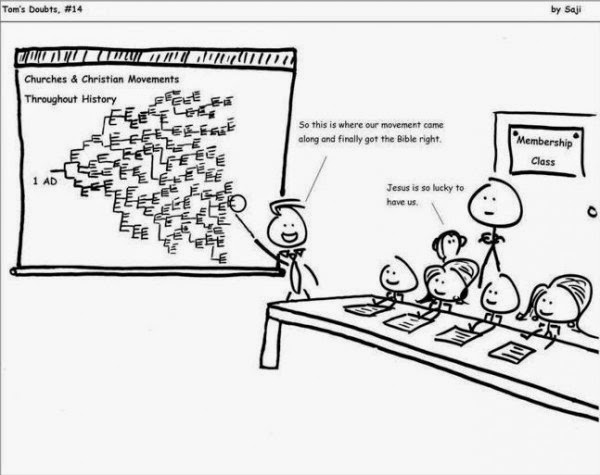“I Will Write It in Their Hearts”
Jeremiah 16; 23; 29; 31
LDS manual: here
Reading
Jeremiah was a bit of a drama guy. He liked to act stuff out. One time he broke a clay jar in front of a bunch of people, as a way of saying, “This is what God is going to do to you.”
19:1 Thus saith the LORD, Go and get a potter’s earthen bottle, and take of the ancients of the people, and of the ancients of the priests;
19:2 And go forth unto the valley of the son of Hinnom, which is by the entry of the east gate, and proclaim there the words that I shall tell thee,
19:3 And say, Hear ye the word of the LORD, O kings of Judah, and inhabitants of Jerusalem; Thus saith the LORD of hosts, the God of Israel; Behold, I will bring evil upon this place, the which whosoever heareth, his ears shall tingle.
…
19:10 Then shalt thou break the bottle in the sight of the men that go with thee,
19:11 And shalt say unto them, Thus saith the LORD of hosts; Even so will I break this people and this city, as one breaketh a potter’s vessel, that cannot be made whole again: and they shall bury them in Tophet, till there be no place to bury.
Another time he wore a yoke around his neck, like so:
27:2 Thus saith the LORD to me; Make thee bonds and yokes, and put them upon thy neck,
27:3 And send them to the king of Edom, and to the king of Moab, and to the king of the Ammonites, and to the king of Tyrus, and to the king of Zidon, by the hand of the messengers which come to Jerusalem unto Zedekiah king of Judah;
27:4 And command them to say unto their masters, Thus saith the LORD of hosts, the God of Israel; Thus shall ye say unto your masters;
27:5 I have made the earth, the man and the beast that are upon the ground, by my great power and by my outstretched arm, and have given it unto whom it seemed meet unto me.
27:6 And now have I given all these lands into the hand of Nebuchadnezzar the king of Babylon, my servant; and the beasts of the field have I given him also to serve him.
27:7 And all nations shall serve him, and his son, and his son’s son, until the very time of his land come: and then many nations and great kings shall serve themselves of him.
27:8 And it shall come to pass, that the nation and kingdom which will not serve the same Nebuchadnezzar the king of Babylon, and that will not put their neck under the yoke of the king of Babylon, that nation will I punish, saith the LORD, with the sword, and with the famine, and with the pestilence, until I have consumed them by his hand.
So, you know, he liked his props.
But because of the bad reviews, Jeremiah got pretty cranky. Murderously cranky. He asked God to kill everyone who didn’t believe him.
18:19 Give heed to me, O LORD, and hearken to the voice of them that contend with me.
18:20 Shall evil be recompensed for good? for they have digged a pit for my soul. Remember that I stood before thee to speak good for them, and to turn away thy wrath from them.
18:21 Therefore deliver up their children to the famine, and pour out their blood by the force of the sword; and let their wives be bereaved of their children, and be widows; and let their men be put to death; let their young men be slain by the sword in battle.
He was basically the angry guy at the train station muttering to himself.
Then the governor threw him in prison, and Jeremiah got so cranky, he told the governor that Jehovah was going to kill him and all his friends.
20:1 Now Pashur the son of Immer the priest, who was also chief governor in the house of the LORD, heard that Jeremiah prophesied these things.
20:2 Then Pashur smote Jeremiah the prophet, and put him in the stocks that were in the high gate of Benjamin, which was by the house of the LORD.
20:3 And it came to pass on the morrow, that Pashur brought forth Jeremiah out of the stocks. Then said Jeremiah unto him, The LORD hath not called thy name Pashur, but Magormissabib.
20:4 For thus saith the LORD, Behold, I will make thee a terror to thyself, and to all thy friends: and they shall fall by the sword of their enemies, and thine eyes shall behold it: and I will give all Judah into the hand of the king of Babylon, and he shall carry them captive into Babylon, and shall slay them with the sword.
And then he said he’d kill the entire world.
25:32 Thus saith the LORD of hosts, Behold, evil shall go forth from nation to nation, and a great whirlwind shall be raised up from the coasts of the earth.
25:33 And the slain of the LORD shall be at that day from one end of the earth even unto the other end of the earth: they shall not be lamented, neither gathered, nor buried; they shall be dung upon the ground.
One of the crimes of the Baal-worshippers was that they sacrificed their children, which Jehovah said hadn’t even occurred to him.
19:5 They have built also the high places of Baal, to burn their sons with fire for burnt offerings unto Baal, which I commanded not, nor spake it, neither came it into my mind:
No? What about Jephthah’s daughter? When Israelites sacrifice their children to Jehovah, they can’t stop talking about how great it is.
Anyway, what’s Jehovah going to do to show them that killing children is wrong? Make them eat their kids, of course.
19:9 And I will cause them to eat the flesh of their sons and the flesh of their daughters, and they shall eat every one the flesh of his friend in the siege and straitness, wherewith their enemies, and they that seek their lives, shall straiten them.
Sounds legit.
Main points from this lesson
God will write his law in the hearts of his people.
The real lesson manual says this:
• As recorded in Jeremiah 31:31–34, what did the Lord promise to do in the latter days?
31:33 But this shall be the covenant that I will make with the house of Israel; After those days, saith the LORD, I will put my law in their inward parts, and write it in their hearts; and will be their God, and they shall be my people.
What does it mean to have God’s law written in our hearts? What must we do to have God’s law written in our hearts?
I have to say that if God could write his law in people’s hearts, this would actually be a good way for a god to do things. At least, it would be far better than his current method of writing books. I’ve mentioned before that human language is a really terrible way for a god to get his message across because it’s imprecise, it changes over time, and it requires translation to get to different people. Each of those things allows for the introduction of error — and wiggle room for apologists. So it would really be quite sensible for a god to skip human language altogether, and just beam his message directly into people, so they’d know what he wanted.
Except it doesn’t work out that way. For one thing, if God is “writing his law in people’s hearts”, there sure is a lot of variation in the messages he’s sending them. Anyone who’s had a doctrinal disagreement with someone in church — and had the other person defend their view by saying “I’ve prayed about this” — knows that this is no way to defend a point of view. Why is it so easy to dismiss someone else’s view if God has written it in their hearts? Why would he have different people come to opposite conclusions?
When I was at the dear old Brigham Young University in 1986 — yes, that long ago — there was a production of West Side Story. (This was the official Drama department production; not the one I was in.) The big talk on campus was that a Black student named Michelle Harris didn’t get cast because she was Black. Pretty ironic, considering the anti-racism subject matter of the play. Here was the clincher, though. At the time, Harris told the media — and I can’t recover this from the Internet, so this comes from my imperfect memory — that she prayed to know whether she’d been discriminated against, and the Spirit™ told that indeed she had. I don’t doubt this was the case, but having lived in Utah, I didn’t need a ghost to tell me that. For her, though, this was good enough to take it public.
At the time, I was dismissive. Sure, I thought, revelation could tell you about the meaning of life and existence of a god, but surely it wasn’t reliable for that! But why not? Why didn’t I see that I didn’t really believe in personal revelation?
The Mormon community is composed of a lot of people driven by emotional reasoning. What a weird and irrational way for people to be.
Friedrich Nietzsche once said (or was it Dolly from the Nietzsche Family Circus)
Even if the law were written in our hearts, why would it be reliable? Jeremiah even warns:
17:9 The heart is deceitful above all things, and desperately wicked: who can know it?
Again, it would be incredibly useful for a god to communicate directly; the problem is that he doesn’t. He tells everybody something different, which is why religions proliferate.
Prophet v Prophet Deathmatch
There’s a great story here between Jeremiah and another prophet, Hananiah. Hananiah tells everyone that everything is going to be fine, and Babylon won’t invade.
28:2 Thus speaketh the LORD of hosts, the God of Israel, saying, I have broken the yoke of the king of Babylon.
28:3 Within two full years will I bring again into this place all the vessels of the LORD’s house, that Nebuchadnezzar king of Babylon took away from this place, and carried them to Babylon:
Jeremiah, still wearing his yoke, tells everyone (and rather snippily, too) that Babylon will in fact capture Israel.
28:6 Even the prophet Jeremiah said, Amen: the LORD do so: the LORD perform thy words which thou hast prophesied, to bring again the vessels of the LORD’s house, and all that is carried away captive, from Babylon into this place.
28:7 Nevertheless hear thou now this word that I speak in thine ears, and in the ears of all the people;
28:8 The prophets that have been before me and before thee of old prophesied both against many countries, and against great kingdoms, of war, and of evil, and of pestilence.
Yep, it’s a prophet-off.
So Hananiah, in a theatrical gesture, breaks the yoke off of Jeremiah’s neck!
28:10 Then Hananiah the prophet took the yoke from off the prophet Jeremiah’s neck, and brake it.
28:11 And Hananiah spake in the presence of all the people, saying, Thus saith the LORD; Even so will I break the yoke of Nebuchadnezzar king of Babylon from the neck of all nations within the space of two full years. And the prophet Jeremiah went his way.
Jeremiah can’t think of anything to say to that. But then later, he thinks of the perfect retort:
28:12 Then the word of the LORD came unto Jeremiah the prophet, after that Hananiah the prophet had broken the yoke from off the neck of the prophet Jeremiah, saying,
28:13 Go and tell Hananiah, saying, Thus saith the LORD; Thou hast broken the yokes of wood; but thou shalt make for them yokes of iron.
Don’t you hate it when you think of a great comeback, but it’s like the next day?
When two different people predict something, how do you know who’s right? Well, with science, it’s not impossible. You look at the different models, and see whose model best fits the data. But religion doesn’t have a good way of settling a situation where you have conflicting prophets. You have to either wait until the thing happens — in which case, what’s the point of having a prophet? — or God will kill the prophet who’s wrong, in which it becomes some kind of prophetic war of attrition. Again, what a strange and unreliable system.
Jehovah does kill Hananiah later on that year. Under ambiguous circumstances that could have been natural.
28:17 So Hananiah the prophet died the same year in the seventh month.
Say, is this where Mormons got the idea that God will kill any prophet who leads people astray?
Additional lesson ideas
Hunters and fishers
Here’s one from Jeremiah. Who are the ‘hunters and fishers’?
16:16 Behold, I will send for many fishers, saith the LORD, and they shall fish them; and after will I send for many hunters, and they shall hunt them from every mountain, and from every hill, and out of the holes of the rocks.
The real lesson manual explains:
Elder LeGrand Richards said that the fishers and hunters described in Jeremiah 16:16 are missionaries of the Church (in Conference Report, Apr. 1971, 143; or Ensign, June 1971, 98–99). What do fishers and hunters have in common with missionaries? (See Matthew 4:18–19.)
Answer: For both, after they catch something, the thing ends up dead. Notice also that animals and fish don’t want to be caught. They have to be grabbed. Tricked, if necessary.
Looking at investigators as prey is a very unhelpful way of looking at people with different beliefs. I say ‘unhelpful’ because of my own experiences as a missionary. We were told that success in the mission field was predicated on our obedience to mission rules and personal righteousness. It was as though we were trained to think of investigators as largely inert beings with no direction or history or thoughts of their own. They could be influenced to believe in our message because of things that we did.
But why would that be true? Imagine if that were the case. A family needs the gospel so they can return to live with Heavenly Father, but in order for God to make them feel inspired to join his church, God first demands that a couple of twenty-something missionaries starve themselves for a while. Whoops, one of them beat off a couple of times, so no eternal salvation for that family. It’s such a surreal scenario that I can hardly believe that I bought into it for so long.
Bad, evil, and naughty
The King James Version of Jeremiah shows us some interesting changes that were happening to English in Jacobean times. One concernes some very naughty figs.
24:2 One basket had very good figs, even like the figs that are first ripe: and the other basket had very naughty figs, which could not be eaten, they were so bad.
Nowadays, we think of naughty in a mischievous (and often a sexual) sense. But when the word first arose in about 1400, it meant ‘having nothing’ (from naught). It didn’t take long for the meaning to change into something different: by 1460, the word meant ‘bad’. Usually naughty was used for people,
Sir Richard Benet, parson of Estcodford, a nawghty man.
but also for food.
The bigaroon cherries..were fraudulent, sour, and naughty throughout
This meaning has faded since the 1600s, and in fact naughty isn’t as naughty as it used to be. Rather than describing someone of low character, it now could describe an impish child, or perhaps someone you’d like to meet.
If naughty has become nice, then evil has become downright debased.
24:3 Then said the LORD unto me, What seest thou, Jeremiah? And I said, Figs; the good figs, very good; and the evil, very evil, that cannot be eaten, they are so evil.
We don’t usually use evil to describe food (unless perhaps an evil smell is emanating from the kitchen). Evil has always been pretty evil since the word began in the 900s. For a time, though, the word was applied to things that were substandard or unwholesome, and this sense in captured in Jeremiah.
They govern themselves
Again, from the lesson manual:
• Joseph Smith was once asked how he successfully governed so many people. He said, “I teach the people correct principles and they govern themselves” (quoted by John Taylor, in Journal of Discourses, 10:57–58).
Ask: Do Latter-day Saints seem self-governed, or micro-managed?
If a church:
- Tells you what to eat and drink
- Tells you what to read
- Tells you what kind of entertainment to select
- Tells you what kind of cards not to use
- Tells you what to do and what not to do on Sunday
- Tells you what kind of artwork to have in your house
- Tells you what you’ll be doing from ages 18–20 or so
- Controls every aspect of your life during that time
then how is this allowing you to ‘govern yourself’? The ‘governing oneself’ style was probably never a part of the church, but it’s especially incompatible with the authoritarian religion that the LDS Church has become. Which is too bad.




Recent Comments